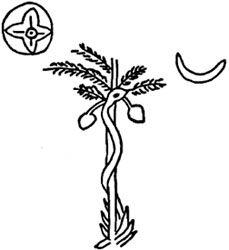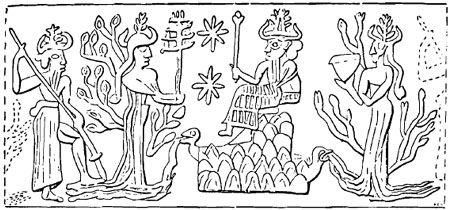The 12th Planet (60 page)
Authors: Zecharia Sitchin
Tags: #Non-Fiction, #Gnostic Dementia, #Fringe Science, #Retail, #Archaeology, #Ancient Aliens, #History

Once more, then, biblical information conforms to scientific findings: Human culture began in the mountainous areas bordering the Mesopotamian plain. What a pity the biblical narrative is so brief, for it deals with what was Man's first civilized life on Earth.
Cast out of the Abode of the Gods, doomed to a mortal's life, but able to procreate, Man proceeded to do just that. The first Adam with whose generations the Old Testament was concerned "knew" his wife Eve, and she bore him a son, Cain, who tilled the land. Then Eve bore Abel, who was a shepherd. Hinting at homosexuality as the cause, the Bible relates that "Cain rose up unto his brother Abel and killed him."
Fearing for his life, Cain was given a protective sign by the Deity and was ordered to move farther east. At first leading a nomad's life, he finally settled in "the Land of Migration, well east of Eden." There he had a son whom he named Enoch ("inauguration"), "and he built a city, and called the name of the city after the name of his son." Enoch, in turn, had children and grandchildren and great-grandchildren. In the sixth generation after Cain, Lamech was born; his three sons are credited by the Bible as the bearers of civilization: Jabal "was the father of such as dwell in tents and have cattle"; Jubal "was the father of all that grasp lyre and harp"; Tubal-cain was the first smith.
But Lamech, too, as his ancestor Cain, became involved in murder—this time of both a man and a child. It is safe to assume that the victims were not some humble strangers, for the Book of Genesis dwells on the incident and considers it a turning point in the lineage of Adam. The Bible reports that Lamech summoned his two wives, mothers of his three sons, and confessed to them the double murder, declaring, "If Cain be sevenfold avenged, Lamech shall seventy and seven fold." This little-understood statement must be assumed to deal with the succession; we see it as an admission by Lamech to his wives that the hope that the curse on Cain would be redeemed by the seventh generation (the generation of their sons) had come to naught. Now a new curse, lasting much longer, had been imposed on the house of Lamech.

Fig. 158

Fig. 159
Confirming that the event concerned the line of succession, the following verses advise us of the immediate establishment of a new, pure, lineage:
And Adam knew his wife again
and she bore a son
and called his name Seth ["foundation"]
for the Deity hath founded for me
another seed instead of Abel, whom Cain slew.
The Old Testament at that point loses all interest in the defiled line of Cain and Lamech. Its ongoing tale of human events is henceforth anchored on the lineage of Adam through his son Seth, and Seth's firstborn, Enosh, whose name has acquired in Hebrew the generic connotation "human being." "It was then," Genesis informs us, "that it was begun to call upon the name of the Deity."
This enigmatic statement has baffled biblical scholars and theologians throughout the ages. It is followed by a chapter giving the genealogy of Adam through Seth and Enosh for ten generations ending with Noah, the hero of the Deluge.
The Sumerian texts, which describe the early ages when the gods were alone in Sumer, describe with equal precision the life of humans in Sumer at a later time, but before the Deluge. The Sumerian (and original) story of the Deluge has as its "Noah" a "Man of Shuruppak," the seventh city established by the Nefilim when they landed on Earth.
At some point, then, the human beings—banished from Eden—were allowed to return to Mesopotamia, to live alongside the gods, to serve them, and to worship them. As we interpret the biblical statement, this happened in the days of Enosh. It was then that the gods allowed Mankind back into Mesopotamia, to serve the gods "and to call upon the name of the deity."
Eager to get to the next epic event in the human sage, the Deluge, the Book of Genesis provides little information besides the names of the patriarchs who followed Enosh. But the meaning of each patriarch's name may suggest the events that took place during his lifetime.
The son of Enosh, through whom the pure lineage continued, was Cainan ("little Cain"); some scholars take the name to mean "metalsmith." Cainan's son was Mahalal-El ("praiser of god"). He was followed by Jared ("he who descended"); his son was Enoch ("consecrated one"), who at age 365 was carried aloft by the Deity. But three hundred years earlier, at age sixty-five, Enoch had begotten a son named Methusela
h
; many scholars, following Lettia D. Jeffreys
(Ancient Hebrew Names: Their Significance and Historical Value)
translate Methusela
h
as "man of the missile."
Methusela
h
's son was named Lamech, meaning "he who was humbled." And Lamech begot Noa
h
("respite"), saying: "Let this one comfort us concerning our work and the suffering of our hands by the earth which the deity hath accursed."
Humanity, it appears, was undergoing great deprivations when Noah was born. The hard work and the toil were getting it nowhere, for Earth, which was to feed them, was accursed. The stage was set for the Deluge—the momentous event which was to wipe off the face of Earth not only the human race but all life upon the land and in the skies.
And the Deity saw that the wickedness of Man
was great on the earth,
and that every desire of his heart's thoughts
was only evil, every day.
And the Deity repented that He had made Man
upon the earth, and His heart grieved.
And the Deity said:
"I will destroy the Earthling whom I have created
off the face of the earth."
These are broad accusations, presented as justifications for drastic measures to "end all flesh." But they lack specificity, and scholars and theologians alike find no satisfactory answers regarding the sins or "violations" that could have upset the Deity so much.
The repeated use of the term
flesh,
both in the accusative verses and in the proclamations of judgment, suggest, of course, that the corruptions and violations had to do with the flesh. The Deity grieved over the evil "desire of Man's thoughts." Man, it would seem, having discovered sex, had become a sex maniac.
But one can hardly accept that the Deity would decide to wipe Mankind off the face of Earth simply because men made too much love to their wives. The Mesopotamian texts speak freely and eloquently of sex and lovemaking among the gods. There are texts describing tender love between gods and their consorts; illicit love between a maiden and her lover; violent love (as when Enlil raped Ninlil). There is a profusion of texts describing lovemaking and actual intercourse among the gods—with their official consorts or unofficial concubines, with their sisters and daughters and even granddaughters (making love to the latter was a favorite pastime of Enki). Such gods could hardly turn against Mankind for behaving as they themselves did.
The Deity's motive, we find, was not merely concern for human morals. The mounting disgust was caused by a spreading defilement of the gods themselves. Seen in this light, the meaning of the baffling opening verses of Genesis 6 becomes clear:
And it came to pass,
When the Earthlings began to increase in number
upon the face of the Earth,
and daughters were born unto them,
that the sons of the deities
saw the daughters of the Earthlings
that they were compatible,
and they took unto themselves
wives of whichever they chose.
As these verses should make clear, it was when the sons of the gods began to be sexually involved with Earthlings' offspring that the Deity cried, "Enough!"
And the Deity said:
"My spirit shall not shield Man forever;
having strayed, he is but flesh."
The statement has remained enigmatic for millennia. Read in the light of our conclusions regarding the genetic manipulation that was brought to play in Man's creation, the verses carry a message to our own scientists. The "spirit" of the gods—their genetic perfection of Mankind—was beginning to deteriorate. Mankind had "strayed," thereby reverting to being "but flesh"—closer to its animal, simian origins.
We can now understand the stress put by the Old Testament on the distinction between Noah, "a righteous man ... pure in his genealogies" and "the whole earth that was corrupt." By intermarrying with the men and women of decreasing genetic purity, the gods were subjecting themselves, too, to deterioration. By pointing out that Noah alone continued to be genetically pure, the biblical tale justifies the Deity's contradiction: Having just decided to wipe all life off the face of Earth, he decided to save Noah and his descendants and "every clean animal," and other beasts and fowls, "so as to keep seed alive upon the face of all the earth."
The Deity's plan to defeat his own initial purpose was to alert Noah to the coming catastrophe and guide him in the construction of a waterborne ark, which would carry the people and the creatures that were to be saved. The notice given to Noah was a mere seven days. Somehow, he managed to build the ark and waterproof it, collect all the creatures and put them and his family aboard, and provision the ark in the allotted time. "And it came to pass, after the seven days, that the waters of the Deluge were upon the earth." What came to pass is best described in the Bible's own words:
On that day,
all the fountains of the great deep burst open,
and the sluices of the heavens were opened....
And the Deluge was forty days upon the Earth,
and the waters increased, and bore up the ark,
and it was lifted up above the earth.
And the waters became stronger
